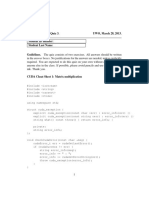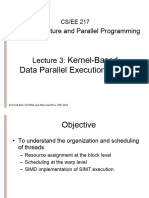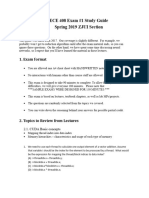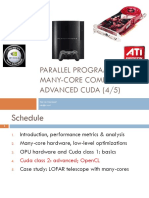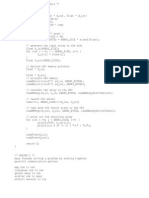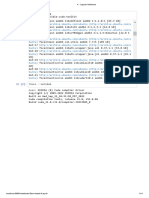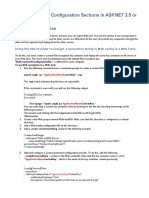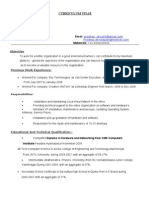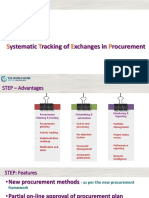Teaching ECE408 at Scale
Abdul Dakkak
!1
�Overview
IMPACT "
History"
Architecture"
Some data"
Lessons"
Future
01
!2
�Quick Demo
!3
�IMPACT
Nothing similar exists"
Possibly the most visible project in our group"
Works for CUDA/OpenCL/OpenACC/"
Thousands of users spent hundreds of hours on the
site"
Production vs research implementation
!4
�Objective
Create a programming
environment for the Coursera
course"
Allow people to develop
outside of the environment"
Not be tied into Coursera
(want to offer it for summer
school)
01
!5
�Previous System
Many user interface issues"
Grading was done offline"
Had trouble with scaling
Did not have peer reviewing
!6
�New System
Instant grading and
submission back to Coursera"
Peer review implemented"
Scaling was kept in mind"
Making a new MP is simple
01
!7
�How do you grade 4000 Programs?
You dont.
Architecture
!8
�Life of a Program Submission
!9
�Library+!
User Code
Life of a
Worker
Program
Submission
User interacts with a web server"
Web server dispatches job to one of
many workers"
Grades get communicated with
Coursera
Library+!
User Code
Library+!
User Code
Worker
Worker
Web!
Server
DB
Cours-!
era
!1010
�Detailed Architecture
!11
�Made it public,
so got some help
from students
Correlated and
source of major
problems (happens
on Cyclone and AWS)
Source of Bugs
Incorrect or
inefficient
queries
!12
�db
ox
ed
ro
ot
Sa
n
no
n-
Library+!
User Code
Library+!
User Code
Library+!
User Code
Worker
Worker
Worker
Web!
Server
DB
Security
Sandbox users code"
Workers, web server, and
DB are run with no privileges"
A simple proxy server routes all port
80 requests to the web server
no
n-
ro
ot
Cours-!
era
!1013
�How to Scale?
Each request is a lightweight thread
(thousands of these)"
The lightweight threads get mapped to n
threads (n being the number of cores)"
Create a connection pool with the
database server"
Most of operations are asynchronous "
Master can communicate to any number
of workers"
Worker will run programs on different
GPUs if available
Web!
Server
DB
Worker
Web!
Server
Worker
!1014
�Scale
What works for 2 people may not work for 1000 people"
What works for 1000 people may not work when all are logged in
at the same time"
What works for 1000 people on day 1 may not work for 1000
people on day 50
!15
�Lessons Learned (Implementation)
!16
�Abstraction is not a Good Thing
At the start of the course, we were using a library to
simplify database queries it did simplify them, but
generated complex queries that were not possible to
debug
!17
�Abstraction is a Great Thing
When we replaced the library, had to replace just the
model code in the application
!18
�Lessons Learned (Human)
!19
�Lessons Learned
Negative criticism speaks louder than positive ones"
People do not read documentation or search the forums"
You will feel discouraged and moody for the rest of the day"
You will answer the same thing over and over and over again"
People will send you their code and ask you to debug them"
They will feel like you are not doing your job if you tell them no
!20
�Data
!21
�Data Collected
Google Analytics"
A 13Gb database containing"
2 Million program revisions"
700 thousand program runs"
Runtime/Compilation time / errors"
6 thousand graded programs"
A 7Gb Event database containing"
CPU/GPU information"
What pages users Visited
!22
�Thousands of Visitors
!23
�Users from All over the World
!24
�People Spend Time on the Site
!25
�Grades
!26
�Most People Passed
939 actually started the course XXXX this is not correct FIXME"
989 got over 80%"
648 got over 100%
!27
�Some Data Insights
Date
!28
We made all course MPs
available on day 1"
Everyone waited until the last
minute"
Every MP has 2 bumps one
for submitting the code and
another for the peer review
n
D
ow
M
P1
D
ue
ue
D
W
eb
si
te
,3
P2
M
People Submit at
the Last Minute
Grade Timeline
01
�Students Work
Program save timeline
!30
Some people do not
give or receive
feedback"
Some people receive
feedback but do not
give any"
Some people give
feedback but do not
receive any
Peer Review Relies on Participation
Image Convolution MP
!31
�Data Analysis Opportunities
!32
�!
!
#define BLOCK_SIZE 16
__global__ void MatMulKernel(float *DA, float *DB, float *DC, int Ah, int Aw,
int AwTiles, int Bh, int Bw) {
// Block row and column
if (cellRow >= Ah)
int blockRow = blockIdx.y;
return;
int blockCol = blockIdx.x;
if (cellCol >= Bw)
return;
// Thread row and column within Csub
int row = threadIdx.y;
DC[cellRow * Bw + cellCol] = Cvalue;
int col = threadIdx.x;
}
!
!
!
!
//
//
//
//
!
!
int cellRow = blockRow * BLOCK_SIZE + row;
int cellCol = blockCol * BLOCK_SIZE + col;
// Each thread computes one element of Csub
// by accumulating results into Cvalue
float Cvalue = 0.0;
Loop over all the sub-matrices of A and B that are
required to compute Csub
Multiply each pair of sub-matrices together
and accumulate the results
#pragma unroll
for (int m = 0; m < AwTiles; ++m) {
// Shared memory used to store Asub and Bsub respectively
__shared__ float As[BLOCK_SIZE][BLOCK_SIZE];
__shared__ float Bs[BLOCK_SIZE][BLOCK_SIZE];
// Load Asub and Bsub from device memory to shared memory
// Each thread loads one element of each sub-matrix
int aRow = BLOCK_SIZE * blockRow + row;
int aCol = BLOCK_SIZE * m + col;
float aValue = ((aRow < Ah) && (aCol < Aw));
aValue *= DA[Aw * aRow + aCol];
As[row][col] = aValue;
!
!
int bRow = BLOCK_SIZE * m + row;
int bCol = BLOCK_SIZE * blockCol + col;
float bValue = ((bRow < Bh) && (bCol < Bw));
bValue *= DB[Bw * bRow + bCol];
Bs[row][col] = bValue;
// Synchronize to make sure the sub-matrices are loaded
// before starting the computation
__syncthreads();
// Multiply Asub and Bsub together
for (int e = 0; e < BLOCK_SIZE; ++e)
Cvalue += As[row][e] * Bs[e][col];
// Synchronize to make sure that the preceding
// computation is done before loading two new
// sub-matrices of A and B in the next iteration
__syncthreads();
}
!
!
!!
__global__ void nop() {}
//
//
CITE: Vasily Volkov, UC Berkeley.... Intresting approach to using
//caching a bit differently... had to give it a try...
//
__device__ void saxpy(float a, float *b, float *c) {
c[0] += a * b[0];
c[1] += a * b[1];
c[2] += a * b[2];
c[3] += a * b[3];
c[4] += a * b[4];
c[5] += a * b[5];
c[6] += a * b[6];
c[7] += a * b[7];
c[8] += a * b[8];
c[9] += a * b[9];
c[10] += a * b[10];
c[11] += a * b[11];
c[12] += a * b[12];
c[13] += a * b[13];
c[14] += a * b[14];
c[15] += a * b[15];
}
!
!
!
!
!
!
A += 4 * lda;
saxpy(a[0], &bs[0][0],
a[0] = A[0 * lda];
saxpy(a[1], &bs[1][0],
a[1] = A[1 * lda];
saxpy(a[2], &bs[2][0],
a[2] = A[2 * lda];
saxpy(a[3], &bs[3][0],
a[3] = A[3 * lda];
c);
c);
c);
c);
A += 4 * lda;
saxpy(a[0], &bs[4][0],
a[0] = A[0 * lda];
saxpy(a[1], &bs[5][0],
a[1] = A[1 * lda];
saxpy(a[2], &bs[6][0],
a[2] = A[2 * lda];
saxpy(a[3], &bs[7][0],
a[3] = A[3 * lda];
c);
c);
c);
c);
A += 4 * lda;
saxpy(a[0], &bs[8][0], c);
a[0] = A[0 * lda];
saxpy(a[1], &bs[9][0], c);
a[1] = A[1 * lda];
saxpy(a[2], &bs[10][0], c);
a[2] = A[2 * lda];
saxpy(a[3], &bs[11][0], c);
a[3] = A[3 * lda];
A += 4 * lda;
saxpy(a[0], &bs[12][0],
saxpy(a[1], &bs[13][0],
saxpy(a[2], &bs[14][0],
saxpy(a[3], &bs[15][0],
c);
c);
c);
c);
SGEMM Implementation
!
!
__global__ void optimisedDLA(const float *A, int lda, const float *B, int ldb,
B += 16;
float *C, int ldc, int k) {
__syncthreads();
const int inx = threadIdx.x;
}
while (B < Blast);
const int iny = threadIdx.y;
const int ibx = blockIdx.x * 64;
for (int i = 0; i < 16; i++, C += ldc)
const int iby = blockIdx.y * 16;
C[0] = c[i];
const int id = inx + iny * 16;
}
.
A += ibx + id;
!
!
!
!
!
B += inx + __mul24(iby + iny, ldb);
C += ibx + id + __mul24(iby, ldc);
const float *Blast = B + k;
float c[16] = {0, 0, 0, 0, 0, 0, 0, 0, 0, 0, 0, 0, 0, 0, 0, 0};
do {
float a[4] = {A[0 * lda], A[1 * lda], A[2 * lda], A[3 * lda]};
__shared__ float bs[16][17];
bs[inx][iny] = B[0 * ldb];
bs[inx][iny + 4] = B[4 * ldb];
bs[inx][iny + 8] = B[8 * ldb];
bs[inx][iny + 12] = B[12 * ldb];
__syncthreads();
!33
�Analysis Opportunities
What errors are most common?"
What optimizations are most beneficial?"
Can we detect those and give feedback"
Which did users have the most problems with?"
What causes GPUs to crash?"
Can we avoid those?"
Did people plagiarize?"
What does the peer review tell us?
!34
�Source of Data
This is a big data problem"
Different analysis can be performed on different parts"
Program analysis on programs"
Power analysis on recorded GPU power draw"
NLP on questions and peer review
!35
�What would be different?
!36
�Lessons Learned
Volunteer TAs were very helpful and allowed me to
spend less than 30 hours a day on the forums"
Not everyone will perform peer reviews, which means
that not everyone will get feedback"
Some people just criticize for the sake of it you need
to develop a thicker shell
!37
�Current Work
!38
�Current Work
Build up some tools for data analysis"
Course work projects"
Porting Parboil to threaded Java and Renderscript"
ZOne a compiler/language to explore Map/Reduce
compiler optimizations"
Optimization Machine learning+Vision applications
!39
�Questions?
!40
